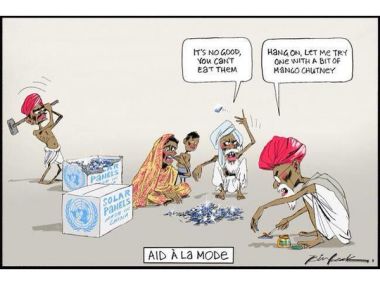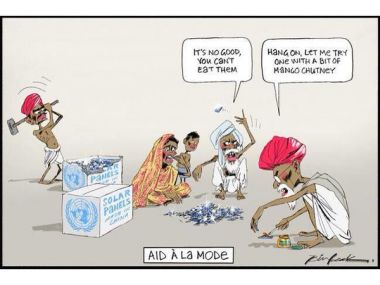Bill Leak’s cartoon
is not racist. There, I said it, and will repeat it: Bill Leak’s cartoon is not racist. It’s plenty of other things: Ignorant, insensitive, exaggerated, reductive, irresponsible, regressive, infantile — honestly, who eats glass? — and that’s just for starters. Racism is an allegation thrown around all too freely these days. In fact, it’s rare to find an instance of a person of one race doing anything to another of a different race that is not seen as being racist. That we as a people are losing our sense of humour is a different case to be made in a different piece. But back to the cartoon, and if you look closer, and beneath the image that was perceived to be
‘insulting to all Indians’
, lies a hint, if not an overwhelming stench, of insecurity and perhaps even bitterness. Insecurity about what, you may well ask. [caption id=“attachment_2546246” align=“alignleft” width=“380”]
 Bill Leak’s cartoon that appeared in The Australian. Image Courtesy: Twitter/@BLeakEksplayned[/caption] A clue lies in the
statement issued by The Australian
, the publication that published the cartoon titled ‘Aid À La Mode’, where it defended the illustration. After the requisite PR niceties — calling India the ‘technology centre of the world’ and lauding it for being home to the ‘most high-tech industries on the planet — and an extollation of ‘freedom of speech’, came the most pertinent part of the statement: “The cartoon does not intend to ridicule Indians but the climate change activists who would send poor people solar panels rather than give them something they need — cheap power, aid and a hand up.” Cheap power, it could be argued, will come from having solar cells set up in villages — a hand up of sorts, and aid, in an entitlement-driven society like India, is something we are actively trying to move beyond. But someone at The Australian forgot to read that memo. Nevertheless, at the heart of the cartoon, and indeed the statement issued by the publication, lies what appears to be some regret about the fact that Australia,
once a global leader in solar technology
, has slipped back into the grasp of coal. Furthermore, in a report released this year, it was revealed that the percentage of Australia’s electricity that came from renewable sources had dropped — a phenomenon unseen for seven years — from
14.76 percent in 2013 to 13.47 percent in 2014
. The Paris climate agreement has heightened this sense of insecurity.
According to The Guardian
, Australia, one of the ‘world’s highest per capita emitters’ will be under immense pressure to revise its emission reduction target. The report concludes that the COP21 agreement should lead Australia to stop “pretending that climate policy is something that can be papered over, or worked around, or ignored, or used as a political attack weapon”. This brings us back to the statement issued by The Australian. Couching the antipathy towards ‘climate change activists’ within the narrative of aid being sent to the impoverished, is a clever trick. It gets you the ‘how-dare-they-insult-India/the poor/developing world’ outrage, the anger and most importantly, the eyeballs — and allows you to deliver your message to a much wider audience. The use of imagined stereotypes to illustrate the broader agenda was in one word, infantile. Why on earth would anyone eat solar panels — with or without mango chutney? A smarter and dare I say it, sharper satire would be having the people in the frame selling off their solar cells. But it’s Bill’s cartoon, not mine. Maybe if it had been a cartoon drawn by me — an Indian, allegations of being racist, never mind ‘
unequivocally racist
’ would not be hurled at me. Only accusations of being ignorant, insensitive, exaggerated, reductive and the rest.
Bill Leak’s cartoon that appeared in The Australian. Image Courtesy: Twitter/@BLeakEksplayned[/caption] A clue lies in the
statement issued by The Australian
, the publication that published the cartoon titled ‘Aid À La Mode’, where it defended the illustration. After the requisite PR niceties — calling India the ‘technology centre of the world’ and lauding it for being home to the ‘most high-tech industries on the planet — and an extollation of ‘freedom of speech’, came the most pertinent part of the statement: “The cartoon does not intend to ridicule Indians but the climate change activists who would send poor people solar panels rather than give them something they need — cheap power, aid and a hand up.” Cheap power, it could be argued, will come from having solar cells set up in villages — a hand up of sorts, and aid, in an entitlement-driven society like India, is something we are actively trying to move beyond. But someone at The Australian forgot to read that memo. Nevertheless, at the heart of the cartoon, and indeed the statement issued by the publication, lies what appears to be some regret about the fact that Australia,
once a global leader in solar technology
, has slipped back into the grasp of coal. Furthermore, in a report released this year, it was revealed that the percentage of Australia’s electricity that came from renewable sources had dropped — a phenomenon unseen for seven years — from
14.76 percent in 2013 to 13.47 percent in 2014
. The Paris climate agreement has heightened this sense of insecurity.
According to The Guardian
, Australia, one of the ‘world’s highest per capita emitters’ will be under immense pressure to revise its emission reduction target. The report concludes that the COP21 agreement should lead Australia to stop “pretending that climate policy is something that can be papered over, or worked around, or ignored, or used as a political attack weapon”. This brings us back to the statement issued by The Australian. Couching the antipathy towards ‘climate change activists’ within the narrative of aid being sent to the impoverished, is a clever trick. It gets you the ‘how-dare-they-insult-India/the poor/developing world’ outrage, the anger and most importantly, the eyeballs — and allows you to deliver your message to a much wider audience. The use of imagined stereotypes to illustrate the broader agenda was in one word, infantile. Why on earth would anyone eat solar panels — with or without mango chutney? A smarter and dare I say it, sharper satire would be having the people in the frame selling off their solar cells. But it’s Bill’s cartoon, not mine. Maybe if it had been a cartoon drawn by me — an Indian, allegations of being racist, never mind ‘
unequivocally racist
’ would not be hurled at me. Only accusations of being ignorant, insensitive, exaggerated, reductive and the rest.
Solar-powered showdown: Bill Leak's cartoon is a lot of things, but it's not racist
Karan Pradhan
• December 15, 2015, 18:15:10 IST
The use of imagined stereotypes to illustrate the broader agenda was in one word, infantile. Bill Leak’s cartoon is a lot of things, but it’s not racist.
Advertisement
)